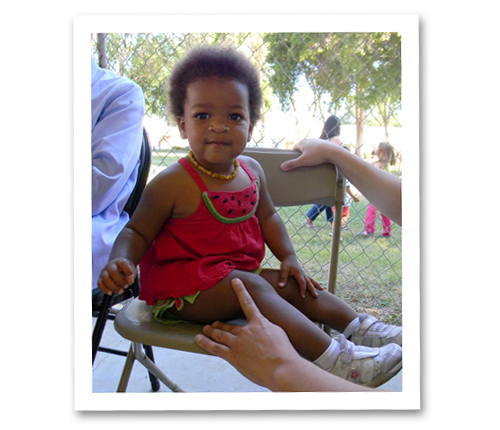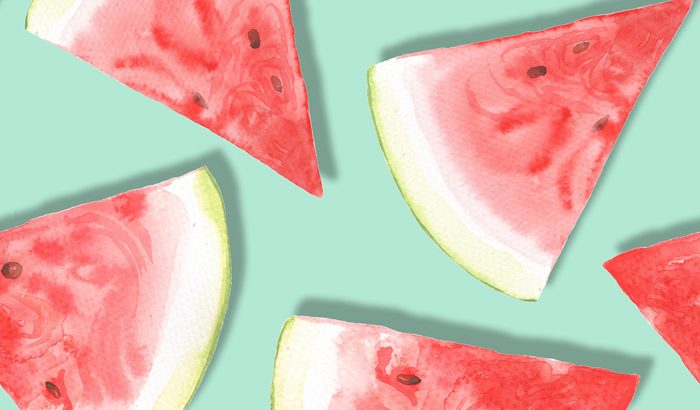If you’re a member of any online adoption groups or forums, you’ll regularly see the question, “Can black children wear [this article of clothing]?” The clothing in question may be adorned with watermelons, monkeys, or other jungle animals, or it may be as seemingly innocuous as a pair of plain overalls. Whenever I see those kinds of questions, I think of the following picture:

The lovely lady in this photo is my daughter Cassie, then 19 months old. She is at the County Fair and she is wearing an outfit given to us by a friend—a shirt decorated with a crocheted watermelon paired with watermelon shorts.
Some people will find this problematic, while others will not. Why is that?
More Than Meets the Eye
As more families become multiracial, white people are learning more about racism and the many ways it can manifest. I learned the term “microaggression” only when I adopted black children. What is a microaggression? According to Psychology Today:
“Microaggressions are the everyday verbal, nonverbal, and environmental slights, snubs, or insults, whether intentional or unintentional, which communicate hostile, derogatory, or negative messages to target persons based solely upon their marginalized group membership.”
Black people belong to a marginalized group. This is the crux of the question, “Can my child wear this?” Images and writing on clothes may, consciously or unconsciously, bring to mind or reinforce racist stereotypes. Take the monkey, for example, an animal commonly found on children’s clothes. A white parent might not give a second thought to dressing her white child in a shirt with a picture of a monkey. But, historically, white people have derisively compared black people to monkeys, so a black child wearing that same Curious George shirt may trigger completely different thoughts, or even perpetuate the negative stereotype.
Monkeys aren’t the only animal or symbol associated with negative stereotypes for black people. Other problematic imagery includes:
- Raccoons, because the word “coon” was a derogatory term used to refer to black people
- Bananas, because of the association between bananas and the aforementioned monkeys
- Zebras, because the term “zebra” is an insult to biracial (black and white) people, as well as evocative of the next item on the list…
- Jungle imagery, because of the association between jungles and monkeys, and because the word “jungle” is at the root of several derogatory black stereotypes
- Watermelons, because of imagery dating from the era of slavery and emancipation
- Alligators, because of the stories that black babies were used as “alligator bait” during this same period
So, what are black kids allowed to wear? Can one just say, “No monkeys. No bananas. No watermelons. Ever.” Some people do, but I think it’s a lot more complex than “don’t put your child in this.” Some black parents have no problem with their children wearing a watermelon print, while others do. Some parents feel that the guidelines are the same for all parents, while others feel that white parents of black children are and must be held to different standards.
Stereotypes—and Safety
I posed the following questions to my Facebook friends and to an adoption-related Facebook group:
“Are there some clothing items that black children should never be allowed to wear? Why or why not? If there are rules about clothing, are they different for black parents of black children than for white parents of black children?”
The responses, which came from both parents of color and white parents of black children, ran the gamut from “They’re just clothes!” (a quote from Saundra, my son’s multiracial birth mother) to “I never want to put my child in the position of some racist being able to degrade him simply because I thought [the clothing] was cute” (a quote from my longtime friend Paula, who is black). I was surprised that white and black moms shared the same range of opinions. That is, parents of neither race were overwhelmingly for or against such imagery on clothing.
Some black respondents did acknowledge that clothing choices might be different for white parents than for black parents. My friend Shaina (who is biracial, black and white), said, “I think white parents need to be more aware of those things because the disparaging associations with things like monkeys and jungles come from white people saying it to black people.” It seemed that white mothers of adopted black children did have heightened sensitivity to clothing choices, even if they didn’t necessarily prohibit their children from wearing any or all of the images listed. My friend Louise (who is white) noted, “[White adoptive parents] need to prepare our children for how to be literate in both white and black cultures. This includes helping them navigate the negative stereotypes they may encounter.” She is very careful about what her young sons wear, down to ensuring that they are never barefoot and their clothes aren’t ripped or stained.
There is a socioeconomic component to what children, in general, and black children specifically, wear. Some white adoptive parents may be looking at what they see black people in the media wear, as opposed to what black people in their social sphere wear. One of the best pieces of advice I’ve heard is that white adoptive parents should “observe what kids of color in [their] area are wearing and to choose appropriate styles” (from Susannah, a white adoptive mom). Dressing children completely differently than their peers may “other” them even more.
The question of safety also came up in this discussion. My black son was seven when George Zimmerman was acquitted after fatally shooting Trayvon Martin. Since then, I have not let my son wear hoodies. We explained to him that a young man had been shot, ostensibly because the shooter thought the boy was dangerous because he was wearing a hoodie. When I shared this, a friend of mine (who is black) noted that her community center didn’t allow kids to wear hoodies either. When discussing all of the shootings that have happened since then with my son, who is now 11, he noted, “I’m glad I’m short, because I don’t look dangerous to anyone.” However, other moms, including black moms, said that hoodies weren’t an issue for them.
From a more philosophical perspective, perhaps it is best to look at the images on clothing and ask: Is this image degrading to my child or his culture? While researching for this article, I learned that Mickey Mouse may have his roots in racism. Yet, people are far more likely to associate Mickey Mouse with rabid copyright lawyers, blatant consumerism, and micromanaged, though completely enthralling, theme parks than the black-faced minstrels on whom he may have been based.
This brings us back to the titular watermelon. When Cassie outgrew this outfit, we passed her clothes on to another friend—a black mom to eight children, biological and adopted. I specifically asked her whether or not she wanted the watermelon outfit. Her response was along the lines of, “Why wouldn’t I?” I contacted her for this article, and this was her insight, “I have never even thought of those options as having a negative impact on my kids, and I have never experienced among the black people and family I associate with any thought of those images being unacceptable attire for our little ones. I would say, as the children grow up, there are clothing options that become controversial, and there is great dialogue among the black community about them! For example, do you let your kids sag their pants because that is fashionable or do you require them to pull their pants up? Hoodie or no hoodie? And do you base your stance on personal belief or are you succumbing to the pressure of a society that doesn’t appreciate or respect your culture? From my experience, these conversations are much more likely to happen in the black community than whether little kids have cute little monkeys or watermelon slices on their shirts.”
I do think white parents of black children must understand the historical context and potential meaning of, or safety concerns raised by, specific clothing choices. However, as is the case with so many parenting questions, there is no one right answer.



